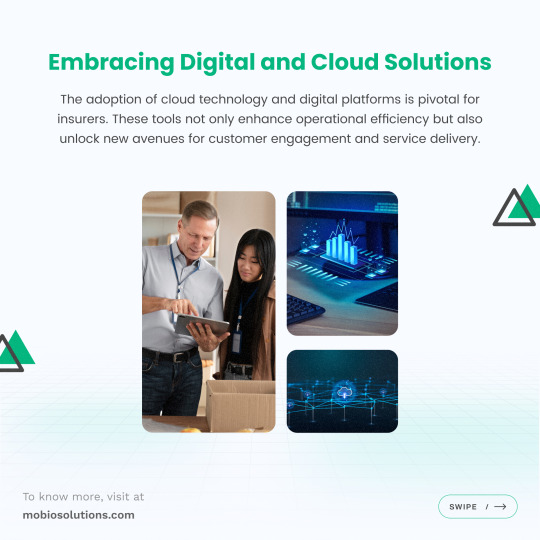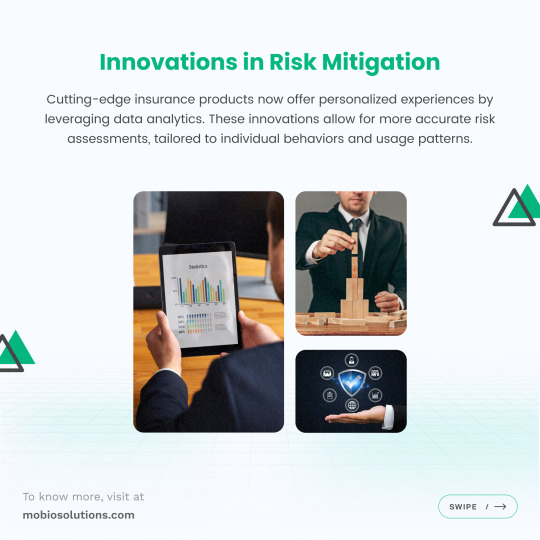#insurtech solutions
Explore tagged Tumblr posts
Text
Nightshift CCTV Operator
Job title: Nightshift CCTV Operator Company: Corps Security Job description: of ‘loyalty, integrity, service’, we have become the UK’s most established and respected specialist security services provider… Assignment Instructions. Record all events and actions monitored from within the control room. Respond and react… Expected salary: £13.1 per hour Location: Paisley Job date: Fri, 27 Jun 2025…
#Aerospace#audio-dsp#Automotive#Blockchain#Crypto#Cybersecurity#DevOps#full-stack#govtech#insurtech#iOS#legaltech#low-code#Machine learning#metaverse#power-platform#prompt-engineering#Python#quantum computing#React Specialist#regtech#robotics#rpa#scrum#site-reliability#SoC#solutions-architecture#technical-writing#telecoms
3 notes
·
View notes
Text
Reimagine Your Business with Aixtor’s Insurance Portal Solution
Struggling with outdated systems, rising customer demands, or complex compliance needs? We get it — and we’ve built the solution.
At Aixtor, we help insurance companies modernize with: ✅ Customer Self-Service Portals ✅ Agent & Partner Portals ✅ Secure Policy Management ✅ Seamless Claims Processing ✅ Scalable, Future-Ready Architecture
🔒 Boost compliance 💼 Streamline operations 📈 Drive customer satisfaction
Let’s turn your digital challenges into growth opportunities. Read More: https://www.aixtor.com/industry/insurance/
👉 Explore our Insurance Portal Solutions today!

#InsuranceTech#DigitalInsurance#CustomerExperience#InsurTech#PortalSolutions#Aixtor#InsuranceInnovation#DXP#Liferay#customer self service portal#Agent portal#Insurance portal#insurance solutions#insurance software
0 notes
Text
0 notes
Text
In this interview, Rob Stavrou of Zywave discusses the importance of ecosystem thinking in the insurance industry. He explores how integrating technology platforms can enhance operational efficiency and customer experience. Stavrou also highlights the collaboration between Zywave and AdvantageGo in creating innovative solutions for insurers.
#commercial insurance#advantagego ecosystem#insurance ecosystem#insurance solutions#insurtech#insurance#insurance news
0 notes
Text








Revamp your insurance biz with our latest insights! Dive into digital transformations, AI advancements, and innovative risk mitigation strategies to stay ahead.
0 notes
Text
Transforming insurance with Salesforce! From AI to personalized experiences, see how tech sets new standards in efficiency and growth..
0 notes
Text
NaXum for Insurance Companies: Revolutionizing Growth and Tackling Attrition Challenges
The insurance industry has long been acknowledged as one of the oldest forms of multi-level marketing. However, insurance companies continue to grapple with attrition issues despite its longevity, posing significant challenges in maintaining a steady force of agents and brokers. Here’s where NaXum, renowned for its referral marketing expertise, transforms the landscape.

Understanding the Core Challenges
Attrition has persistently haunted insurance companies, leading to concerns about the costs and resources invested in recruiting and training new agents. Companies face a significant investment due to the unique demands of the insurance sector, spanning licensing to training. Unfortunately, the attrition rates often compromise the return on this investment.
The Power of Predictive Mobile Apps in the Insurance Realm
NaXum, known for its Predictive Mobile App, has been a game-changer for various sectors. This app has emerged as a virtual mentor in the insurance domain, guiding agents and brokers through daily activities that contribute to success. Its ability to engage individuals in daily habits, such as reaching out, following up, and growing online presence, fosters a sense of commitment among agents.
NaXum’s Unify Platform: Beyond Marketing Tools
For insurance companies partnering with NaXum, the Unify platform extends beyond just marketing systems. It integrates marketing tools with the commission engine, streamlining operations and offering a comprehensive solution. This all-encompassing approach helps create a structured environment that nurtures agents, encouraging them to stay committed and engaged.
Solving Attrition with Community-Driven Tools
The core solution lies in creating a supportive community that promotes consistent engagement. NaXum’s tools, including replicated marketing systems, webinar platforms, and the Predictive Mobile App, instigate a sense of belonging among agents. The commitment to daily goals, suggested content for social media sharing, and a collaborative environment foster a spirit of camaraderie, addressing attrition challenges.
Empowering Insurance Companies for Growth
NaXum’s dedicated approach to revolutionizing referral marketing aligns seamlessly with the insurance industry’s needs. By leveraging the Predictive Mobile App and the Unify platform, NaXum doesn’t just offer tools; it nurtures a culture of commitment, community, and success. The shift from traditional methods to a community-driven, technology-infused environment is pivotal for insurance companies seeking sustainable growth.
Conclusion
NaXum’s tailored solutions, designed specifically for the insurance sector, aim to bridge the attrition gap and establish a new paradigm of growth and engagement. For insurance companies seeking to revamp their strategies and create lasting impact, NaXum emerges as the partner of choice.
To learn more about NaXum’s transformative solutions for insurance companies, explore our tour at NaXumTour.com for insights and case studies.
#NaXum#NaXumApp#NaXumReviews#ReferralMarketing#DirectSales#DirectSelling#InsuranceInnovation#Solutions#InsuranceTech#AttritionChallenge#Insurtech#InsuranceIndustry#PredictiveApps#InsuranceAgents#InsuranceCompany#InsuranceGrowth
0 notes
Text
IKS Health acquires AQuity for $200M to expand its presence in hospitals

- By InnoNurse Staff -
IKS Health, a firm specializing in administrative, clinical, operational, and revenue technology solutions, has completed a $200 million acquisition of AQuity Solutions, extending its service offerings from ambulatory care providers to hospitals.
Read more at Fierce Healthcare
///
Other recent news and insights
Yuzu Health wants to challenges "brittle technology" within health insurance companies (Fierce Healthcare)
#iks health#health it#health tech#aquity solutions#hosptitals#health systems#yuzu health#insurance#insurtech#health insurance
0 notes
Text
Outdated Technology Is No Recipe for Success in Any Insurance Company
The insurance industry is witnessing a profound shift due to changing consumer attitudes and technological advancements. To thrive in this dynamic landscape, insurance companies must replace legacy technology with advanced digital systems. This blog explores: https://www.rdglobalinc.com/outdated-technology-is-no-recipe-for-success-in-any-insurance-company/ the need for digital transformation, its benefits, and the three modernization paths insurers can choose.

Benefits of Digital Transformation:
Digital transformation offers numerous advantages to insurance organizations.
Enhanced Service Provisions and Internal Processes
Faster Customer Service
Efficient Risk Assessment and Product Innovation
Access to Data
Reduced Costs
Insurers with legacy systems have three modernization approaches to choose from:
Modernization Approaches for Insurers:
Insurance companies have three modernization options.
Modernizing Existing Legacy IT Platform
Refactoring legacy systems allows some modernization without complete rebuilding, though it can be complex and costly.
Building a Proprietary IT Platform:
Creating a custom system tailored to the company's needs offers flexibility but may have longer timelines and higher costs.
Acquiring a Standard Software Package:
Opting for standard software systems with readymade functionalities provides quicker implementations and cost-effectiveness.
Conclusion:
Digital transformation is imperative for insurers to thrive in the ever-changing business landscape. By embracing advanced technologies, insurance companies can enhance customer service, target marketing efforts, and reduce costs. Selecting the appropriate modernization approach depends on the company's unique requirements and available resources. RD Global, a software services company, can provide valuable guidance and solutions for insurers undertaking this transformative journey. Contact RD Global today for a comprehensive consultation on your digital transformation requirements.
#rdglobalinc#insurtech#insurance software development company#custom insurance software development#insurance software solutions
0 notes
Text
The Rise of Fintech: Transforming Financial Services for the Digital Age

In recent years, Fintech—short for Financial Technology—has emerged as a disruptive force in the financial services industry. From mobile payments to blockchain technology, fintech innovations are reshaping how individuals, businesses, and financial institutions interact with money. As digital tools continue to evolve, they offer new ways to improve financial efficiency, transparency, and inclusivity.
The rapid rise of fintech is not just a trend; it's a transformative shift that’s reshaping financial landscapes globally. In this article, we will explore what fintech is, how it’s transforming various sectors of financial services, and what the future holds for this exciting industry.
1. What is Fintech?
Fintech is a term that encompasses any technology that improves and automates financial services. This can include innovations in areas like mobile payments, online banking, investment platforms, and even the use of artificial intelligence in managing financial portfolios.
Fintech aims to make financial services more accessible, efficient, and secure. By leveraging digital tools, it allows individuals to manage their finances with ease, whether they're sending money across borders, applying for a loan, or investing in the stock market.
2. The Evolution of Fintech
The roots of fintech can be traced back to the late 20th century, with the introduction of online banking and electronic payments. However, it wasn't until the late 2000s, with the rise of smartphones and digital apps, that fintech truly took off.
The 2008 financial crisis also played a significant role in the development of fintech. Traditional banks struggled, leading to the rise of alternative financial solutions. Startups began creating apps and platforms to offer services such as peer-to-peer lending, robo-advisors, and even digital currencies like Bitcoin.
Today, fintech is booming, with countless companies and startups offering innovative financial products and services that rival traditional financial institutions.
3. The Key Sectors of Fintech
Fintech covers a broad range of sectors, each offering unique innovations that are transforming the way we think about and use financial services. Here are some of the key areas:
a. Digital Payments
One of the most recognizable sectors of fintech is digital payments. Apps like PayPal, Venmo, and Apple Pay have made sending and receiving money faster, more convenient, and cheaper than traditional methods.
Consumers can now make purchases, pay bills, and send money internationally with just a few taps on their smartphone, without needing to rely on banks or physical cash.
b. Lending and Borrowing
Fintech has disrupted the lending industry by providing alternatives to traditional bank loans. Peer-to-peer lending platforms such as LendingClub and Funding Circle allow individuals to lend directly to borrowers, cutting out the middleman and often providing better rates for both parties.
Additionally, fintech lenders have made it easier for small businesses and individuals with less-than-perfect credit scores to access loans through automated credit scoring systems.
c. Investment Platforms
The rise of fintech has made investing more accessible to the general public. Gone are the days when investing required a hefty minimum deposit and working with a financial advisor.
Now, thanks to robo-advisors like Betterment and Wealthfront, individuals can invest with little to no minimum, receiving tailored investment advice through algorithms that automatically adjust portfolios based on risk tolerance and market conditions.
d. Insurtech (Insurance Technology)
Insurtech is another growing sector of fintech, aiming to simplify and improve the insurance industry. From comparing quotes to filing claims, insurance technology platforms like Lemonade are providing a seamless, user-friendly experience for consumers.
These innovations are making insurance more affordable and efficient, particularly for younger consumers who value the convenience of digital interactions.
e. Cryptocurrency and Blockchain
Perhaps the most transformative development in fintech is the rise of cryptocurrencies and blockchain technology. Cryptocurrencies like Bitcoin and Ethereum offer decentralized alternatives to traditional currencies, while blockchain technology provides a secure and transparent way to record transactions.
While still relatively new, cryptocurrencies and blockchain are expected to have far-reaching implications for everything from cross-border payments to smart contracts.
4. How Fintech is Changing Financial Services
Fintech’s influence is broad and deep, transforming almost every facet of financial services. Here’s a closer look at how it’s reshaping the industry:
a. Improving Access to Financial Services
One of the biggest advantages of fintech is that it provides greater access to financial services, particularly for underserved populations. For example, fintech platforms allow people in developing countries, who might not have access to traditional banking, to open accounts and manage their finances using just a smartphone.
Fintech has also revolutionized access to credit. Through digital lending platforms, individuals and small businesses can get loans faster and more easily than ever before, often bypassing the hurdles of traditional banks.
b. Lowering Costs
Fintech companies operate more efficiently than traditional financial institutions, often passing these savings on to consumers in the form of lower fees and better interest rates. This is especially true in sectors like peer-to-peer lending and digital payments, where middlemen have been cut out of the equation.
c. Faster Transactions
In the traditional financial world, sending money, especially internationally, can be a slow and expensive process. Fintech has made these transactions faster, with some payments happening in real time. Digital wallets, payment processors, and blockchain technology are all contributing to instantaneous money transfers, no matter where you are in the world.
d. Personalized Financial Management
Thanks to the use of big data and machine learning, fintech companies can provide highly personalized services. For example, investment platforms use algorithms to create tailored portfolios, while budgeting apps help users track and optimize their spending habits based on individual behavior.
This level of personalization is helping consumers and businesses alike make better financial decisions, driving growth and improving financial health.
5. The Role of Artificial Intelligence in Fintech
Artificial intelligence (AI) is playing a significant role in the fintech industry. AI is used to streamline processes, enhance customer experiences, and improve security measures. For example, chatbots powered by AI can handle basic customer inquiries, freeing up human agents to focus on more complex tasks.
AI also plays a crucial role in fraud detection and cybersecurity, identifying unusual patterns in data and flagging potential threats in real time.
6. Fintech Regulations and Challenges
As fintech continues to grow, so do the regulatory challenges that come with it. Governments and financial institutions around the world are working to create regulatory frameworks that both encourage innovation and protect consumers.
Some key concerns in fintech include data privacy, cybersecurity, and the risk of financial exclusion if certain populations are unable to keep up with technological advances.
There’s also the challenge of navigating the global landscape, as fintech companies often operate in multiple countries, each with its own regulations and standards.
7. The Future of Fintech
The future of fintech looks incredibly promising, with AI, blockchain, and cryptocurrencies leading the charge. Experts predict that in the next few years, we’ll see even more integration between traditional financial institutions and fintech companies, blurring the lines between the two.
In addition to more widespread adoption of digital currencies, the fintech industry is expected to play a key role in financial inclusion, helping to bridge the gap for the 1.7 billion people globally who remain unbanked.
8. How to Get Started in Fintech
If you're interested in fintech, there are plenty of ways to get started. Whether you’re a consumer looking to take advantage of new financial tools, or a professional considering a career in the industry, now is the perfect time to dive in.
Explore Fintech Platforms: Start using digital banking apps, robo-advisors, or digital wallets to familiarize yourself with how fintech works.
Learn About Blockchain and AI: These two technologies are central to the future of fintech. There are plenty of online courses and resources available to help you learn the basics.
Invest in Fintech: Many fintech companies are publicly traded, offering opportunities for you to invest in the future of finance.
9. The Benefits of Fintech for Businesses
Fintech isn’t just changing the landscape for consumers—it’s also revolutionizing how businesses operate. From streamlining payment processes to improving access to capital, fintech is enabling businesses to operate more efficiently and scale faster.
Some benefits for businesses include:
Lower Transaction Fees: Fintech payment processors offer competitive rates compared to traditional banks.
Access to Funding: Digital lending platforms and crowdfunding have opened up new ways for businesses to access funding.
Improved Cash Flow Management: With real-time payment solutions, businesses can improve cash flow and reduce the wait times associated with traditional banking.
10. Conclusion: Fintech is Here to Stay
In conclusion, fintech is not just a buzzword—it’s a revolution that’s changing the way we interact with money and financial services. Whether it’s through digital payments, AI-powered financial tools, or blockchain-based systems, fintech is making finance faster, more accessible, and more secure.
The rise of fintech has already transformed many aspects of financial services, and it shows no signs of slowing down. As technology continues to advance, we can expect fintech to play an even larger role in the global economy.
Are you ready to explore the future of finance? Click here to learn more and stay ahead of the curve with the latest insights: The Rise of Fintech.
#fintech#financetips#investing stocks#personal finance#management#investing#finance#crypto#investment#blockchain#solana#crypto market
2 notes
·
View notes
Text
Insurance IT Consultant Cost Breakdown to Hire
Learn about the cost breakdown when hiring an IT consultant for insurance. Understand fees, services, and how to manage your insurance IT consultant cost.

#insurance it services#insurance technology services#insurance engineering services#insurance it solutions#Insurtech services#insurtech advisors#insurtech solutions#insurtech companies#insurtech company#insurtech development services#insurtech companies in india#insurtech consulting#insurtech software companies#hire insurtech developers#insurtech software development services#insurtech software#insurance software development#insurance software development company#insurance software development services#custom insurance software development#software development insurance#insurance mobile app development#insurance application development#insurance app development
0 notes
Text
Solution Architect | API | Azure
Job title: Solution Architect | API | Azure Company: Method Resourcing Job description: Solution Architect | IoT | Market Leaders | Watford | Hybrid | Centre of Excellence | £80-85,000 | Azure Solution… a Solutions Architect to integrate and consolidate processes across the business. The Role: We’re looking for an experienced… Expected salary: £80000 – 85000 per year Location: Watford,…
#5G#Aerospace#agritech#audio-dsp#Automotive#Blockchain#Broadcast#cloud-native#data-science#deep-learning#digital-twin#Ecommerce#ethical AI#ethical-hacking#full-stack#GIS#hybrid-work#insurtech#iOS#IoT Solutions Architect#metaverse#mlops#power-platform#project-management#prompt-engineering#quantum computing#robotics#system-administration#technical-writing
0 notes
Text
How are startups disrupting traditional industries?
Startups are often at the forefront of disrupting traditional industries by introducing innovative technologies, business models, and approaches. Here are several ways in which startups are causing disruption:
1. Technology Integration
- Startups leverage emerging technologies such as artificial intelligence, blockchain, and the Internet of Things to create more efficient and streamlined processes in industries like finance, healthcare, and manufacturing.
2. E-Commerce and Direct-to-Consumer Models
- E-commerce startups have revolutionized retail by providing direct-to-consumer sales channels, cutting out intermediaries and reducing costs. Companies like Amazon and Alibaba have transformed the way people shop.
3. Sharing Economy
- Startups in the sharing economy, like Uber and Airbnb, have disrupted transportation and hospitality industries by connecting service providers directly with consumers through online platforms.
4. Fintech Innovation
- Fintech startups have transformed the financial services sector by introducing digital payments, robo-advisors, crowdfunding platforms, and blockchain-based solutions, challenging traditional banking models.
5. HealthTech Advancements
- Health technology startups are disrupting healthcare by introducing telemedicine, personalized medicine, wearable devices, and digital health platforms, making healthcare more accessible and efficient.
6. Renewable Energy and CleanTech
- Startups in the clean energy sector are disrupting traditional energy industries by developing innovative solutions for renewable energy, energy storage, and sustainable practices.
7. EdTech Revolution
- Education technology startups are changing the way people learn by offering online courses, interactive platforms, and personalized learning experiences, challenging traditional educational institutions.
8. AgTech and FoodTech
- Agricultural technology startups are improving efficiency and sustainability in farming, while food technology startups are introducing alternative proteins, lab-grown meat, and sustainable food production methods.
9. InsurTech Transformation
- InsurTech startups are leveraging technology to streamline and personalize insurance processes, making insurance more accessible, affordable, and customer-centric.
10. Space Exploration and Aerospace Innovation
- Startups in the space industry are disrupting aerospace by developing cost-effective satellite technologies, commercial space travel, and new approaches to space exploration.
11. Smart Manufacturing
- Startups in the manufacturing sector are implementing Industry 4.0 technologies, such as automation, IoT, and data analytics, to create more agile and efficient production processes.
12. Telecommunications Disruption
- Telecom startups are challenging traditional telecommunications companies by providing innovative solutions for connectivity, communication, and data transfer.
These examples showcase how startups are challenging the status quo across various industries, prompting established companies to adapt, innovate, or risk becoming obsolete. The agility, creativity, and willingness to take risks inherent in many startups enable them to drive significant changes in traditional business landscapes.
3 notes
·
View notes
Text
What’s Next for the Fintech Market? Forecasting 2025 and Beyond

The fintech market is undergoing a period of profound transformation, driven by rapid technological advancement, changing consumer behavior, and evolving regulatory landscapes. As we move into 2025 and beyond, the fintech industry is expected to further revolutionize the way financial services are delivered and consumed. From embedded finance and decentralized platforms to AI-driven decision-making and financial inclusion, the future of fintech services holds vast potential and complexity. Understanding the trends shaping this next phase is essential for businesses, investors, and consumers alike.
Continued Growth and Market Expansion By 2025, the fintech market is projected to grow significantly, fueled by increased digital adoption across sectors. As consumers demand faster, smarter, and more secure financial solutions, fintech companies will expand their offerings to meet these needs. The rise in smartphone usage, internet penetration, and digital payment infrastructure is also playing a critical role in supporting this growth, especially in emerging markets.
Moreover, fintech is no longer confined to just payments or lending. The scope of fintech services is broadening to include digital banking, wealth management, insurance technology (insurtech), regulatory technology (regtech), and beyond. This diversification of services is key to capturing new customer segments and driving industry-wide innovation.
Embedded Finance Will Redefine Financial Access One of the most transformative trends in the future fintech market is embedded finance—the seamless integration of financial services into non-financial platforms. Businesses in retail, e-commerce, logistics, and travel are increasingly embedding payment gateways, lending, insurance, and investment tools directly into their apps and websites.
This shift is expected to explode by 2025, enabling consumers to access financial products where they are most relevant—at the point of need. For instance, a customer shopping online might receive instant loan options or insurance coverage without ever visiting a traditional bank or fintech platform. This blurring of lines between financial and non-financial services will become a standard feature of digital commerce.
Artificial Intelligence Will Power Hyper-Personalized Services AI and machine learning are already critical components of fintech services, but by 2025, their role will be more advanced and omnipresent. These technologies will power real-time fraud detection, automate credit scoring, enable smart investment algorithms, and offer predictive financial planning tools tailored to individual behaviors and goals.
Hyper-personalization will be the norm. Customers will expect their fintech platforms to understand their financial habits, recommend actionable insights, and adapt to their changing life circumstances. AI-powered chatbots, robo-advisors, and intelligent financial dashboards will take center stage, improving user engagement and satisfaction.
Decentralized Finance (DeFi) and Blockchain Will Gain Ground Another area set to grow in the post-2025 fintech market is decentralized finance (DeFi). DeFi platforms leverage blockchain technology to eliminate traditional intermediaries like banks, providing open, transparent, and permissionless financial systems. Users can lend, borrow, invest, and insure assets through smart contracts.
While regulatory uncertainties currently limit widespread adoption, growing interest and innovation in blockchain-based finance are pushing the DeFi movement forward. By 2025 and beyond, we may see more hybrid models where traditional financial institutions partner with decentralized platforms to offer secure, scalable solutions that combine the best of both worlds.
Regulatory Evolution Will Shape Fintech’s Path As fintech services expand in scale and complexity, regulatory bodies will evolve to keep pace. By 2025, we can expect clearer global regulatory frameworks for data privacy, cybersecurity, digital identity, and cryptocurrency. These changes will bring both challenges and opportunities for fintech players.
Striking the right balance between innovation and compliance will be crucial. Regulatory sandboxes—controlled environments where fintech firms can test new products—will become more prominent, fostering innovation while ensuring consumer safety. Companies that prioritize security, transparency, and ethical data use will gain a competitive edge.
Financial Inclusion and Social Impact Will Take Priority A key goal for the future fintech market is promoting financial inclusion. By 2025, we’ll see a stronger push toward designing fintech services that address the needs of underserved populations—such as rural communities, gig workers, migrants, and women.
Mobile banking, micro-lending, and pay-as-you-go insurance models will help bridge the gap for the unbanked and underbanked. Additionally, financial literacy tools and inclusive credit assessment algorithms will ensure that more people have the opportunity to access, understand, and benefit from digital financial ecosystems.
Strategic Partnerships Will Drive Innovation The future of the fintech market will be characterized by strategic partnerships between startups, traditional banks, big tech companies, and infrastructure providers. These collaborations will fuel product innovation, enhance customer experience, and accelerate digital transformation.
One notable example is Xettle Technologies, which plays a critical role in enabling these innovations by offering robust digital infrastructure and development support to fintech firms. By empowering startups and enterprises with scalable technology solutions, Xettle Technologies helps accelerate the launch and growth of next-gen fintech services.
Looking Ahead The fintech market of 2025 and beyond will be dynamic, data-driven, and deeply integrated into the digital lives of consumers. With trends such as embedded finance, AI, DeFi, and financial inclusion at the forefront, the next phase of fintech will not only reshape financial experiences but also redefine the global economic landscape.
As new technologies emerge and regulatory clarity improves, the fintech ecosystem will become more resilient, inclusive, and innovative. For stakeholders across the industry, staying agile, ethical, and consumer-focused will be the key to thriving in this exciting and rapidly evolving future.
0 notes
Text
#commercial insurance#reinsurance software#insurtech#advantagego ecosystem#insurance ecosystem#cyber underwriting solution
0 notes
Text
Sales breakthrough! Our Salesforce CRM solutions cut lead-to-close time in half, boosting lead gen by 54% & client management by 75%. Say goodbye to disorganized data & hello to efficient sales with GetOnCRM Solutions.
0 notes